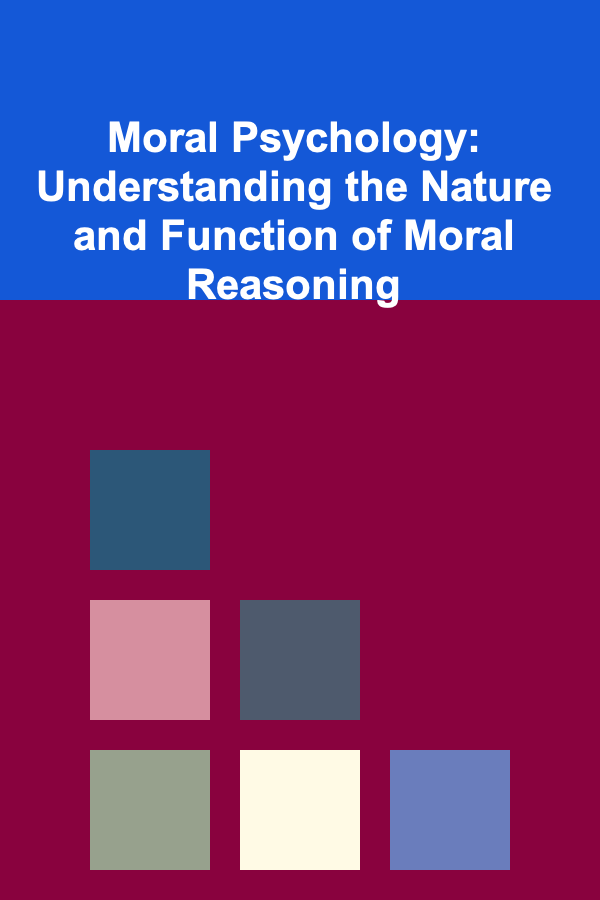
Moral Psychology: Understanding the Nature and Function of Moral Reasoning
ebook include PDF & Audio bundle (Micro Guide)
$12.99$9.99
Limited Time Offer! Order within the next:

Moral psychology is the study of how humans understand and make moral judgments, the processes that shape our ethical decisions, and the motivations behind our actions. It sits at the crossroads of psychology, philosophy, and neuroscience, seeking to understand not only how people think about right and wrong but also why they act in accordance (or opposition) to those thoughts. Through various approaches, researchers in moral psychology have endeavored to explore the nature and function of moral reasoning and its crucial role in guiding human behavior.
In this article, we will delve into the key aspects of moral psychology, examining the cognitive processes involved in moral reasoning, the influence of emotions on ethical decision-making, and the role of culture and upbringing in shaping moral principles. We will also explore the challenges that moral psychology faces and its implications for societal issues.
The Cognitive Foundations of Moral Reasoning
Moral reasoning refers to the cognitive processes by which individuals determine what is right and wrong, good and bad, just and unjust. It is a form of decision-making that extends beyond simple, pragmatic calculations, involving complex evaluations about values, duties, and consequences. At its core, moral reasoning helps humans navigate the ethical dimensions of social life.
Theories of Moral Reasoning
Several prominent theories attempt to explain how moral reasoning works and how individuals come to moral judgments:
- Kohlberg's Stages of Moral Development: One of the foundational models in moral psychology, Lawrence Kohlberg's theory suggests that moral reasoning develops in stages. Kohlberg proposed six stages of moral development, progressing from a self-centered perspective to one that considers universal ethical principles. According to Kohlberg, moral reasoning evolves in a predictable pattern as individuals age, moving from a focus on obedience and punishment to an understanding of justice and human rights.
- Piaget's Moral Development Theory: Jean Piaget's work focused more on the role of cognitive development in moral reasoning. Piaget argued that children pass through stages where they move from a "heteronomous" morality (where rules are seen as fixed and imposed by authority figures) to an "autonomous" morality (where individuals understand that rules are negotiable and based on mutual agreement). Piaget's theory emphasizes the importance of cognitive maturity in moral reasoning.
- Dual-Process Theories: A growing body of research in moral psychology suggests that moral decisions are influenced by two distinct cognitive systems. One system is fast, intuitive, and emotional; the other is slow, deliberate, and rational. Dual-process theories, such as the one proposed by Joshua Greene, suggest that moral judgments often involve both these systems: automatic, gut-level responses to moral dilemmas and more reflective, rational considerations. This theory helps explain why people can sometimes feel morally conflicted---one part of them reacts instinctively, while another part attempts to reason through the dilemma.
The Role of Cognitive Biases
Cognitive biases play a significant role in moral reasoning. These are systematic patterns of deviation from norm or rationality in judgment, and they affect how individuals make moral decisions. For instance:
- Confirmation Bias: People often seek out information that confirms their pre-existing moral beliefs and ignore evidence that contradicts them. This bias can create echo chambers where individuals justify unethical behavior simply because it aligns with their worldview.
- Moral Licensing: After performing a morally good action, such as donating to charity, people may feel they are "licensed" to engage in immoral behavior without feeling guilty. This is an example of how moral reasoning is not always rational and can be influenced by prior actions.
- The "Is-Ought" Gap: Moral reasoning is also complicated by the "is-ought" problem, a term coined by philosopher David Hume. It refers to the difficulty in deriving what "ought" to be from what "is" (i.e., how we feel things should be versus how they actually are). People often use facts to justify ethical conclusions, even though facts alone do not dictate ethical behavior.
Emotions and Moral Decision-Making
While reason plays a key role in moral reasoning, emotions are just as influential, if not more so. Emotional reactions to moral dilemmas often shape how individuals perceive and judge the actions of others.
The Influence of Empathy
Empathy is the ability to understand and share the feelings of others, and it is closely tied to moral behavior. Research suggests that people are more likely to help others, feel sympathy, and engage in prosocial behaviors when they can empathize with their suffering. For example, when faced with a moral dilemma involving harm to others, people who can emotionally connect with the victims are more likely to make decisions that prevent harm.
However, empathy also has limitations. It can be biased toward those we identify with, a phenomenon known as the "empathy gap." People may feel more empathy for individuals who share their race, gender, or socioeconomic background, leading to uneven moral judgments that favor certain groups over others.
The Role of Anger and Disgust
Emotions like anger and disgust can also guide moral decisions. For instance, individuals may feel morally outraged when they perceive injustice or violations of moral norms. Disgust is often triggered by behaviors deemed morally repulsive, such as cheating or lying. These emotional reactions, while sometimes serving as moral guides, can also be extreme, contributing to harsh moral judgments or even social ostracism of those who violate norms.
The Emotional/Reasoning Balance
The challenge for moral psychology lies in understanding how to balance emotional reactions and cognitive reasoning. In some situations, emotional responses lead to moral actions that align with ethical values---such as helping a person in distress. In other situations, unchecked emotions like anger may lead to punitive actions that harm individuals or groups. This complex interplay requires a nuanced understanding of how moral decisions are formed and why they often conflict with the rational principles we strive to uphold.
The Social and Cultural Dimensions of Moral Reasoning
Moral reasoning is not solely an individual pursuit; it is deeply embedded in the social and cultural fabric of human societies. While some moral principles may be universal, moral reasoning is often shaped by cultural norms, societal expectations, and social interactions.
Cultural Differences in Moral Judgments
Moral psychology also explores how different cultures prioritize distinct moral values. For example, collectivist cultures often emphasize values such as community, loyalty, and respect for authority, while individualist cultures tend to focus more on personal freedom, autonomy, and individual rights. These cultural differences affect how people think about justice, fairness, and harm.
Research by psychologists like Richard Shweder has demonstrated that individuals from different cultural backgrounds will often approach moral problems differently. For instance, people from Western cultures may place a higher value on personal rights and liberties, whereas people from Eastern cultures may prioritize the well-being of the group over individual freedoms.
Social Norms and Moral Reasoning
Social norms also play a critical role in shaping moral decisions. From childhood, individuals learn moral norms through socialization processes, such as observing parental behavior, interacting with peers, and receiving feedback from teachers or authority figures. These norms are internalized and shape our moral reasoning without us consciously being aware of it.
Moral norms are not static. They evolve over time as society progresses and as new social movements challenge outdated moral views. For instance, societal attitudes toward issues like gender equality, same-sex marriage, and racial justice have shifted dramatically in recent decades, reflecting the dynamic nature of moral reasoning within a culture.
The Function of Moral Reasoning in Society
Moral reasoning serves several functions, both for the individual and for society as a whole.
Facilitating Cooperation
At a societal level, moral reasoning is crucial for the maintenance of social order and cooperation. Moral principles help individuals navigate complex social environments by providing guidelines for how to interact with others fairly and justly. This fosters cooperation, trust, and reciprocal behavior, all of which are essential for functioning communities.
Building Social Identity
Moral reasoning also plays a role in shaping social identity. People often define themselves based on their moral beliefs and behaviors. For instance, someone who strongly believes in environmental conservation may align their identity with environmental movements, while someone who values personal freedom may affiliate with individualist or libertarian ideologies.
Justifying and Rationalizing Actions
On an individual level, moral reasoning serves to justify and rationalize actions. People often use moral reasoning to explain their behaviors, especially when those behaviors are at odds with societal norms or personal values. By rationalizing actions, individuals seek to resolve cognitive dissonance, a psychological state that occurs when their actions conflict with their beliefs.
Challenges in Moral Psychology
Moral psychology faces several significant challenges. One of the primary difficulties is reconciling the tension between emotional and rational aspects of moral reasoning. As previously mentioned, moral decisions are often influenced by automatic, emotional responses that may not align with logical, reasoned judgment. Understanding how these two systems interact and influence behavior is still a key area of research.
Additionally, moral psychology must contend with the question of moral relativism. While some argue that moral principles are universal, others assert that morals are culturally dependent and subjective. This ongoing debate shapes both psychological theories and the wider discourse on ethics.
Finally, the increasing recognition of moral diversity---due to globalization and interconnected societies---presents a challenge to moral psychology. How can we reconcile different cultural perspectives on morality while maintaining a universal understanding of justice and human rights?
Conclusion
Moral psychology provides a rich framework for understanding the complex interplay between reason, emotion, and culture in the process of moral decision-making. By examining the cognitive mechanisms, emotional influences, and social contexts that shape moral judgments, we gain deeper insight into why people act in ethical or unethical ways. As our understanding of the nature and function of moral reasoning grows, so too does our ability to address the challenges that arise in a morally diverse and interconnected world.
Reading More From Our Other Websites
- [Organization Tip 101] How to Use Labels for Identifying Plants in Your Garden
- [Personal Investment 101] How to Invest in REITs for Diversification and High Returns
- [Home Security 101] How to Integrate Frontpoint Security into Your Existing Home Security Setup
- [Organization Tip 101] DIY Home Maintenance: Easy Fixes You Can Do Yourself
- [Personal Care Tips 101] How to Use Foundation to Create a Bold, Full-Coverage Look
- [Personal Care Tips 101] How to Stay Hydrated with Infused Water: A Comprehensive Guide
- [Star Gazing Tip 101] Gear, Snacks, and Stories: Essential Checklist for a Memorable Group Star‑Gazing Night
- [Home Security 101] How to Make Your Home More Secure While Working from Home
- [Home Budget 101] How to Use Budgeting Apps to Simplify Your Finances
- [Home Cleaning 101] How to Clean Your Refrigerator and Keep It Odor-Free

How to Host a Themed Party That Will Impress Your Guests
Read More
How to Layer Lighting for a Cozy Atmosphere
Read More
How to Make Your Holiday Decor Kid-Friendly and Fun
Read More
How to Make Your Home Smell Like the Holidays
Read More
How to Use AI for Fraud Detection
Read More
10 Tips for Small Urban Gardens: A Landscaping To-Do List
Read MoreOther Products

How to Host a Themed Party That Will Impress Your Guests
Read More
How to Layer Lighting for a Cozy Atmosphere
Read More
How to Make Your Holiday Decor Kid-Friendly and Fun
Read More
How to Make Your Home Smell Like the Holidays
Read More
How to Use AI for Fraud Detection
Read More